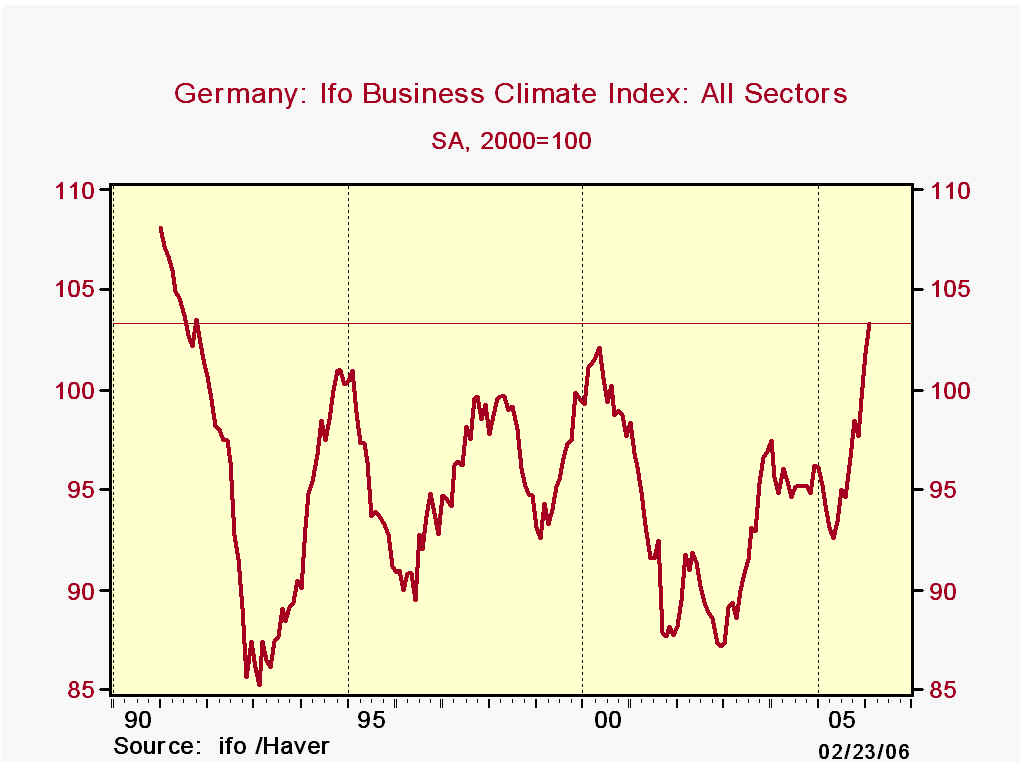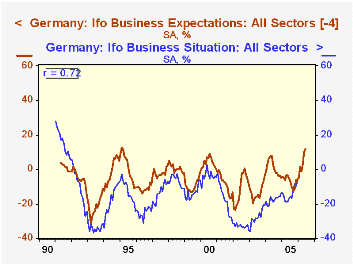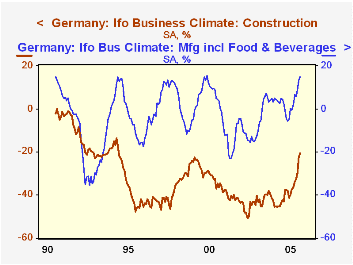 Global| Feb 23 2006
Global| Feb 23 2006German Ifo Surprises on the Upside, Reaches Highest in Nearly 15 Years
Summary
Germany's Ifo Business Climate survey continued and spread the better news about European industry which has been flowing out this week. After a surprisingly good result in January, forecasters expected that the February Ifo index [...]

Germany's Ifo Business Climate survey continued and spread the better news about European industry which has been flowing out this week. After a surprisingly good result in January, forecasters expected that the February Ifo index would retreat a bit. But it added another 1.3 points to the 2000-based index, bringing the level to 103.3, the highest since July 1991. The accompanying diffusion measure rose to +5.8%, its best since October 1991.
The improvement was visible in both current conditions and expectations. The "Business Situation" measure of current activity "rose" to -0.3% for February from -4.5% last month and -15.5% a year ago. Expectations, usually higher than current conditions (but not always) and tending to lead (by about 4 months, as seen in the graph) have been positive in four of the last five months and reached +12% in February, their strongest since late 1994. The leading tendency suggests that the improvement in the business climate should continue in coming months.
All major sectors participated in February's advance: manufacturing, already indicating a net expansion for many months, reached +14.9%, the best level in six years. Construction and retailing activity are still well in negative territory, but have improved dramatically, nonetheless: retailing stands at -7.0% compared with -28.7% a year ago and construction was "only" -20.5%, compared with -42.9% a year ago. This last, while the weakest sector overall, is perhaps most impressive. If prospects for construction activity are looking better, that likely reflects business leaders' belief that the progress in other sectors will justify at least some expansion and/or modernization of facilities. The better outlook in retailing also suggests that those business executives see relative improvements in consumer spending.
| Germany (SA) | Feb 2006 | Jan 2006 | Dec 2005 | Year Ago | 2005 | 2004 | 2003 |
|---|---|---|---|---|---|---|---|
| Ifo Business Climate Index, 2000 = 100 |
103.3 | 101.8 | 99.6 | 95.2 | 95.5 | 95.5 | 91.8 |
| Diffusion % | +5.8 | +2.6 | -1.7 | -10.3 | -9.8 | -10.0 | -17.2 |
| Manufacturing: Diffusion % | +14.9 | +13.6 | +8.9 | +2.5 | +1.1 | +4.4 | -7.9 |
| Construction: Diffusion % | -20.5 | -22.1 | -29.8 | -42.9 | -37.4 | -42.6 | -42.9 |
| Business Situation: Diffusion % | -0.3 | -4.5 | -6.3 | -15.5 | -14.2 | -17.4 | -27.2 |
| Business Expectations: Diffusion % | +12.0 | +10.8 | +3.0 | -5.0 | -5.2 | -2.2 | -6.7 |
Carol Stone, CBE
AuthorMore in Author Profile »Carol Stone, CBE came to Haver Analytics in 2003 following more than 35 years as a financial market economist at major Wall Street financial institutions, most especially Merrill Lynch and Nomura Securities. She had broad experience in analysis and forecasting of flow-of-funds accounts, the federal budget and Federal Reserve operations. At Nomura Securities, among other duties, she developed various indicator forecasting tools and edited a daily global publication produced in London and New York for readers in Tokyo. At Haver Analytics, Carol was a member of the Research Department, aiding database managers with research and documentation efforts, as well as posting commentary on select economic reports. In addition, she conducted Ways-of-the-World, a blog on economic issues for an Episcopal-Church-affiliated website, The Geranium Farm. During her career, Carol served as an officer of the Money Marketeers and the Downtown Economists Club. She had a PhD from NYU's Stern School of Business. She lived in Brooklyn, New York, and had a weekend home on Long Island.





